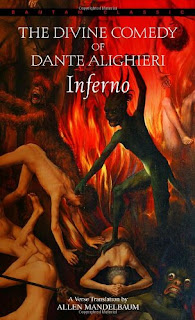

And it is now we start to realize the whole truth about this indecipherable allegory. "Seek and learn to recognize who and what, in the midst of the inferno, are not inferno, then make them endure, give them space." Section 9, page 165. DID YOU SEE THAT? HE SAID INFERNO. INFERNO, I TELL YOU.
Dante's Inferno shows many time unjust tortures that are inflicted on those who don't fit the Great Governor's eye. When in "Cities and Signs 4," Marco Polo says how when he went to the city of Hypatia, he saw beautiful women bathing but underneath them was water with crabs biting the eyes of the suicides, it very similar to a punishment in the other allegory. It is like Italo Calvino were trying to make a twisted allusion or he just tries to say that "good things," maybe such as beauty, aren't priceless.
I have found the answer. The cities have in common their attractiveness. There is not one normal city where there are no extraordinary topics involved. THEY ARE ALL ONE CITY. All because of Kublai Khan's desire for power. Besides, we always knew those cities were figurative stages of life. Just like in Inferno.










